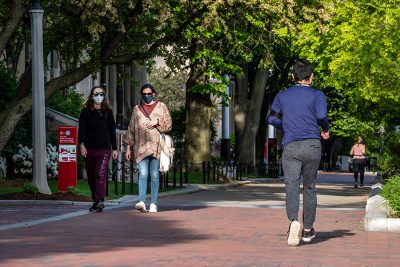
As colleges across the nation are shrouded in uncertainty over how to proceed in the Fall, Boston University is among those that have demonstrated a commitment to returning its students to campus.
BU’s Office of the President released May 15 its summer re-entry plan for select faculty and staff. “Back to On-Campus Work” is the first chapter of a guidebook for a larger, phased reopening plan entitled “Back to BU.”
The phase-one plan offers resources and information, including how to get back to campus with limited public transport and recommendations for individuals’ health, such as continuing virtual meetings, packing personal meals and monitoring for COVID-19 symptoms.
“We are planning a gradual, phased return to on-campus work, informed by public health requirements and guidance,” the guidebook states. “We are working closely with local and state authorities to ensure alignment with their requirements.”
Staff who remained on campus following the March 23 campus-wide shutdown will continue to do so, and only select other personnel will return in the early days. The summer terms will be remote, and staff is encouraged to continue to work from home if possible.
Research will resume slowly in the summer months and the Office of Research has released its own Research Recovery Toolkit with information for lab and research personnel to outline their return plan.
BU established a Medical Advisory Group that works with University officials to determine how, when and if the University’s goal of returning to campus for a fall semester is possible. The guidebook notes that because coronavirus guidelines change constantly, what’s outlined in the plan will update accordingly.
“Guidance is evolving and we will provide frequent updates as the situation warrants,” it reads.
All employees will be required to wear facial coverings or masks on campus. The guidebook anticipates most employees will not need to wear gloves in their everyday tasks, but departments will provide the proper protective gear for those who do.
BU Facilities will routinely clean campus in accordance with U.S. Centers for Disease Control guidelines, but employees are encouraged to disinfect their work surfaces each day as well.
The guidebook provides a list of contacts for staff and faculty support, including the Human Resources page for coronavirus-related absences and the Equal Opportunity Office for accommodations.
BU spokesperson Colin Riley said the focus right now is to restore academic, residential and research operations for the fall. He said senior administration, in consultation with the Board of Trustees, is making decisions about reopening while prioritizing the safety of all members of the community including students, faculty, staff and visitors.
“For the safety and wellbeing of all concerned,” Riley said, “we want to make sure that we put in some guidance and practices that will assure the best possible outcome.”
While a return may take major compromises and modifications of behavior, Riley said he has been pleased with the switch to online learning.
“Faculty and students who finished the semester really adapted to their disruption in the best possible way,” Riley said. “It turned out to have worked out very well.”
Kim McCall, professor and chair of the Biology department, wrote in an email that most faculty have submitted research plans for the summer and are awaiting approval, and buildings are being prepared for researchers to return.
“The plans require less than 30-[percent] occupancy in the labs and specific safety measures,” McCall wrote, “and we will continue to have meetings remotely.”
McCall added that much of her department’s research is funded by the National Science Foundation and the National Institutes of Health, so working in campus laboratories is essential for grants.
Chris Daly, a journalism professor in the College of Communication, wrote in an email that his age, according to CDC guidelines, leaves him with elevated risk of contracting COVID-19. Thus, in the event that campus reopens for fall, he will not return for in-person classes.
“I plan to lecture and host discussions remotely, and I am planning to steal some time from working on my book this summer to explore more of the special features of Zoom and Blackboard,” Daly wrote. “Combined, they can do a fair amount to facilitate discussion, office hours, live pre-test reviews and probably a lot more.”
Daly added he understands the losses that come with the cessation of on-campus learning but has hope for next semester.
“Over 23 years on the faculty, I have been impressed again and again by the resilience, energy and ingenuity of B.U. students,” Daly wrote, “so I am not worried.”
Irene Alexakos, a rising junior in COM, wrote in a Facebook message that life on campus will feel different than previous semesters no matter what.
“It’s hard to predict exactly what the Fall semester will look like, but I definitely think that we need to be prepared for a new normal,” Alexakos wrote. “I know I’m not alone in wanting to be back on campus, but I have a feeling it is going to be a very gradual process and different from what we are used to.”
Ethan Brown, a rising senior in the College of Arts and Sciences and COM, wrote in a Facebook message he hopes that whatever future decisions look like, the administration will continue to prioritize the community’s health and safety.
“Though it wasn’t ideal, Zoom worked better than I would have expected,” Brown wrote. “While I miss my friends a lot, if medical experts still recommend social distancing come Fall, I’d rather continue on Zoom than take unnecessary risks.”

























































































































